Pizza and Presentations: Part 1!
- SCSU English
- Sep 30, 2018
- 4 min read
Updated: Dec 5, 2018
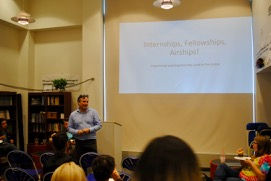
It is no secret Southern's English department is full of talented individuals. Over the past summer the department had FIVE students apply for and win a research grant for a summer fellowship. Each of these students took a topic near and dear to them and researched the heck out of it. Then, they were to create presentations on their topics and experiences and present them to the English department's faculty and students. On Wednesday, September 26 the first three of five students presented their research fellowships. Each fellowship was extremely different, yet all were equally interesting.
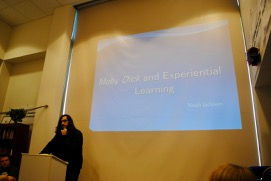
The first presenter of the afternoon, Noah Jackson, dedicated an entire project to researching an effective and interesting way to teach the very dense novel of Moby Dick. Commonly known to make English students everywhere anxious, Moby Dick, has never been a classroom favorite for students. Noah, figured much of this anxiety comes from not having enough historical context. So, he traveled around the areas that showed up in the novel or influenced Melville in writing. One of his suggestions to make it more appealing to the masses was to incorporate this nautical context so it would be more relatable and understandable to students who lack nautical knowledge. Through Noah's project, he created lesson plans, wrote analytical essays, and read and wrote responses to critical analyses. The time and effort that went into this project is quite inspiring. Noah plans to continue to work and research this project and make it a goal of his to see if it can successfully be implemented in a secondary level english class.
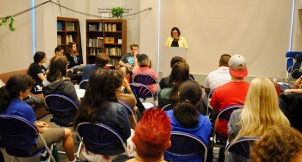
The second presenter was Gema Guevara. Gema did a fantastic job researching and explaining what defines children's fiction as its own literary genre. Gema went into great detail exploring children's fiction. She looked at shared traits of books that fall into this genre. She noted these characteristics and used them to make her argument that children's fiction is its own genre. She noted in developing a children's fiction book most of the time the protagonist is going through a moral revelation. The story in some sense is trying to teach a moral lesson to its reader. Gema did a fantastic job engaging the audience and getting everyone to remember their favorite childhood books. Many of us remember our first favorite childhood book, if we think back it is easy to see that many of those stories did teach us a lesson about life in the simplest, most entertaining form for our developing minds. This is an interesting area of study, because it is newer to the research sphere. Gema closed with explaining how there is a lot of research being done on this study, but there is not tons and tons available yet. Since, it is still a developing topic.
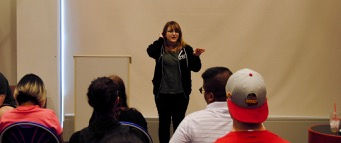
The final presenter of the afternoon was Steff Sirois. Steff's research was just as interesting as the other two. Her presentation was equally engaging. Steff had a very unique opportunity where she got to write creative fiction and figure out a way to implement it in the class room. As Steff mentioned in her presentation, high schools have a very weak selection of English courses to choose from. Especially in the department of creative writing, schools lack availability. And if they do have courses, they are not always appealing to those who want to be in the creative writing class. Steff explained her experiences or lack thereof with creative writing courses in high school. Within her research, she explored ways that creative writing could be more fun and more accessible in secondary education settings. One thing she mentioned was that writing, for herself at least, can be therapeutic. Writing can be a way to escape mundane reality and create a world in which life is completely different and almost like an escape from our actual experiences. High school can be a hard time for most students. Teenagers are very vulnerable and have lots of feelings and emotions they struggle expressing. A creative writing course, such as the one Steff wishes to design, might just be the answer to helping them find a positive outlet for their emotional baggage.
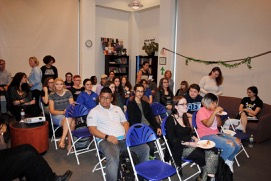
These presentations were inspiring to listen to. All three students put so much time and effort into their work. They also received, $3000 for their research and time spent on the project. As Steff said, it was amazing to get paid to do something she really loved. Opportunities like this are not only amazing for the students and mentors, but many others. For example, the audience that showed up to the presentation learned so much, especially the younger students (freshmen and sophomores) who still have time to apply for these research grants. Another fantastic element of these research grants is that these students who intend to be teachers one day are already starting to make a difference in the classroom and helping to shape the future of teaching for the better. If you were unable to attend this event, there is another on October 30 featuring Michelle Hesse and Madi Csejka in EN D 253 (the english common room) at 7 p.m. I am sure their presentations will be equally as interesting as the three heard on September 26.



Comments